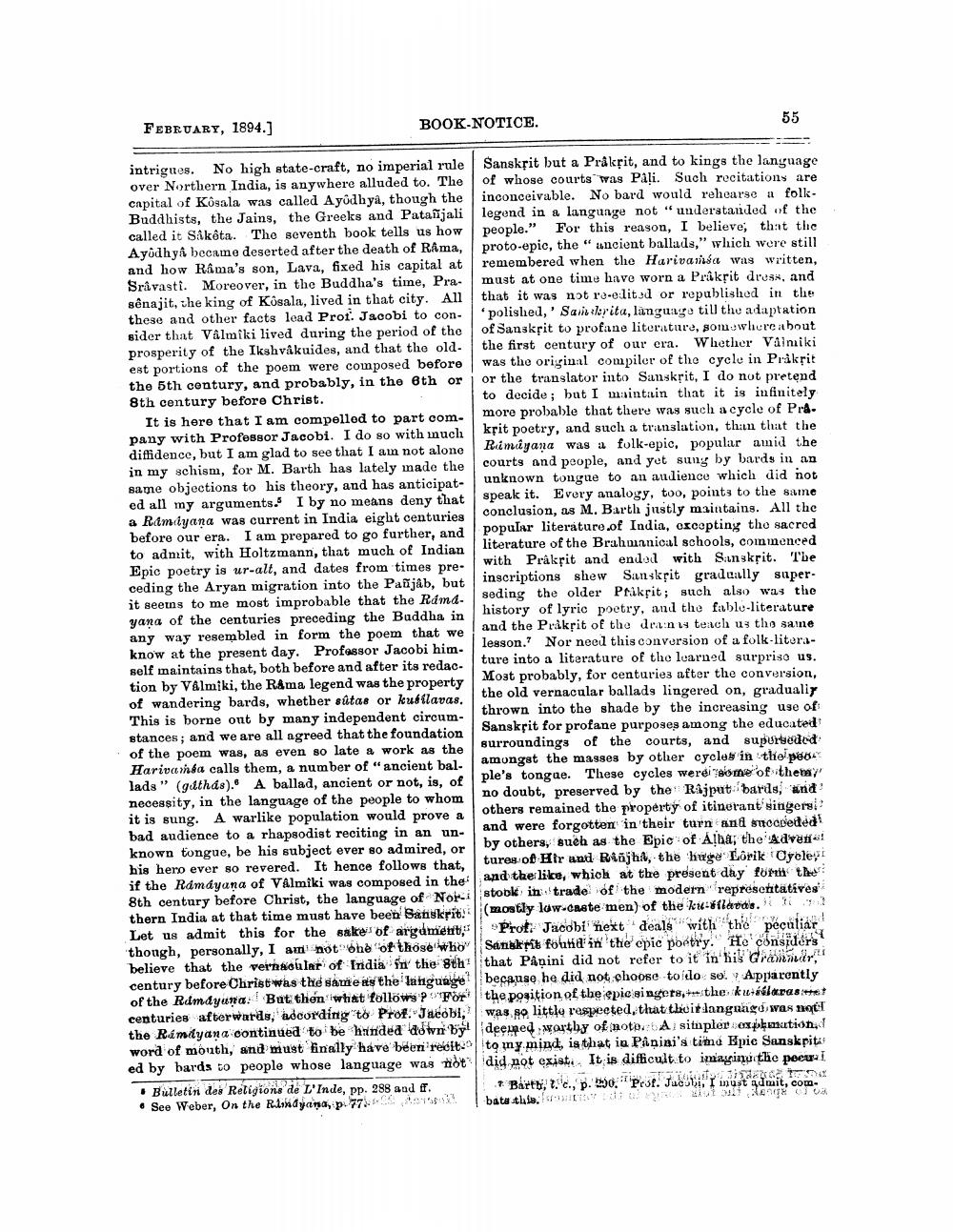________________
FEBRUARY, 1894.)
BOOK-NOTICE.
55
intrigues. No high state-craft, no imperial rule Sanskțit but a Pråkpit, and to kings the language over Northern India, is anywhere alluded to. The of whose courts was Paļi. Such recitations are capital of Kosala was called Ayodhya, though the inconceivable. No bard would rehearse a folk. Buddhists, the Jains, the Greeks and Patanjali legend in a language not "understanded of the called it Saketa. The seventh book tells us how people.” For this reason, I believe that the Ayodhyâ became deserted after the death of Rama, proto-epic, the "uncient ballads," which were still and how Rama's son, Lava, fixed his capital at remembered when the Harivarisa was written, Srivasti. Moreover, in the Buddha's time, Pra. must at one time have worn a Prakrit drusk, and sênajit, the king of Kösala, lived in that city. All that it was not re-elited or republished in the these and other facts lead Prot. Jacobi to con p olished,' Salita, language till the adaptation sider that Valmiki lived during the period of the of Sanskpit to profane literatura, somowhere about prosperity of the Ikshvakuides, and that the old the first century of our era. Whether Valniki est portions of the poem were composed before was the original compiler of the cycle in Priksit the 5th century, and probably, in the eth or or the translator into Sanskrit, I do not pretend 8th century before Christ.
to decide; but I maintain that it is infinitely It is here that I am compelled to part com. more probable that there was such a cycle of Pra. pany with Professor Jacobi. I do so with much kpit poetry, and such a translation, than that the diffidence, but I am glad to see that I am not alone Riimuyana was a folk-epic, popular amid the in my schism, for M. Barth has lately made the courts and people, and yet sung by bards in an same objections to his theory, and has anticipat
unknown tongue to an audience which did not ed all my arguments. I by no means deny that
speak it. Every analogy, too, points to the same a Ramdyana was current in India eight centuries
conclusion, as M. Barth justly maintains. All the before our era. I am prepared to go further, and
Further, and popular literature.of India, oscopting tho sacred to admit, with Holtzmann, that much of Indian
literature of the Brahmanioul schools, commenced Epic poetry is ur-alt, and dates from times pre
with Prakpit and ended with Sanskrit. Tbe ceding the Aryan migration into the Pañjâb, but
inscriptions shew Sanskrit gradually superit seems to me most improbable that the Ramd. Seding the older Prikpit; such also was the yana of the centuries preceding the Buddha in
history of lyric poetry, and the fablo-literature any way resembled in form the poem that we
and the Prakrit of the dean teach us tho sane know at the present day. Professor Jacobi him.
lesson.? Nor need this conversion of a folk-literBelf maintains that, both before and after its redac.
ture into a literature of the learned surpriso us. tion by Valmiki, the R&ma legend was the property
Most probably, for centuries after the conversion, of wandering bards, whether sūtas or kutilavas.
the old vernacular ballads lingered on, graduali This is borne ont by many independent circum
thrown into the shade by the increasing use of stances; and we are all agreed that the foundation
Sanskrit for profane purposes among the educated of the poem was, as even so late a work as the
surroundings of the courts, and superseded Harivar a calls them, a number of "ancient bal.
amongst the masses by other cyclus in the per lads" (githas). A ballad, ancient or not, is, of
ple's tongue. These cycles were some of thebay' necessity, in the language of the people to whom
no doubt, preserved by the Rajput: bards, and it is sung. A warlike population would prove a
others remained the property of itinerant vingers bad audience to a rhapsodist reciting in an un
and were forgotten in their turn and soapeded! known tongue, be his subject ever so admired, or
by others, such as the Epic of Alba, the Adven! his hero ever so revered. It hence follows that, tures of Htr und Rejh, the hug Lorik Oyeleri if the Ramdyana of VAlmiki was composed in the and the like, which at the present day for the 8th century before Christ, the language of Noristobe in trade of the modern representatives thern India at that time must have been Sanskrit: (mostly low-caste men) of the ku flani. Let us admit this for the sake of argument, ProtJacobi next deals with the peculiar! though, personally, I am not one of those who Sanskrit folatid' in the epic poetry. Ho considers believe that the vernacular of India in the 8th that Pâņini did not refer to it in his Gramatur, century before Christ was the same as the language because he did not choose to do sol. Apparently of the Rdmdyuna! But then what follows P'For the position of the epic singers,** the kuráálaras +++ centuries afterwards, adcording to Prof. Jacobi, was so little respected, that their languagd was not the Rimdyana continued to be handed down byl decuped worthy of note. A simpler saxpaution, word of mouth, and must finally have been redit to my mind, is that in Pâniai's tima Epic Sanskpita ed by bards to people whose language was not did not exist. It is difficult to imagine the pecul
• Bulletin des Religions de L'Inde, pp. 288 and . 1. Bartb. . c., p.150.Pest. Justin Tinut it.com • See Weber, On the Riindyana, p.77
bat this




